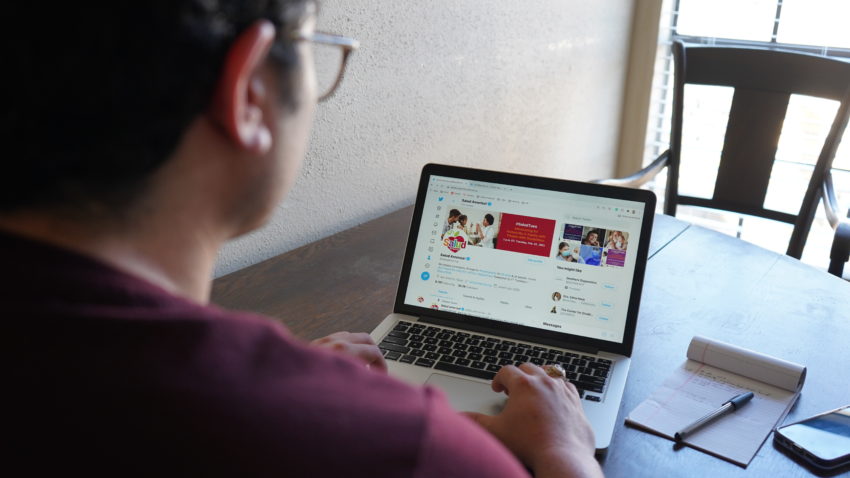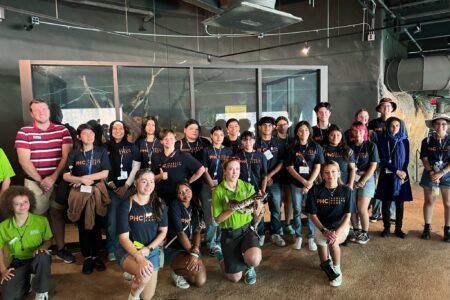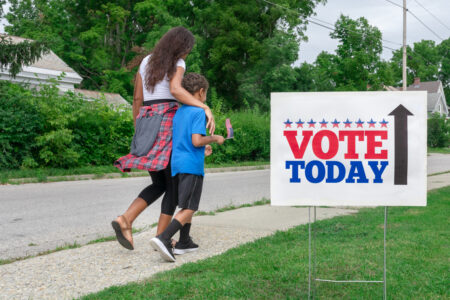
Share On Social!
Data continue to show that systemic inequities, from discrimination to unstable housing to a lack of healthcare access, lead to worse health outcomes for Latinos.
How can we promote system and policy change to address inequities?
Our Salud America! #SaludTues Tweetchats, a weekly hour-long discussion series on Twitter about Latino health equity issues, are an emerging way to engage people in learning and advocacy for change, according to our new study in the Journal of Medical Internet Research (JMIR).
“The study proves that planned, culturally relevant tweetchats like #SaludTues can be a powerful tool for public health practitioners and advocates to engage audiences on Twitter around health issues, advocacy, and policy solutions for Latino health equity,” said Dr. Amelie G. Ramirez, director of Salud America! and the Institute for Health Promotion Research at UT Health San Antonio.
Here is all you need to know about #SaludTues Tweetchats.
What Are Our #SaludTues Tweetchats for Latino Health Equity?
Salud America! created the #SaludTues Tweetchat series in 2014.
We host a one-hour #SaludTues Tweetchat on Twitter from 1-2 p.m. EST every Tuesday. Tweetchats are accessible to anyone on Twitter by following the #SaludTues hashtag.
#SaludTues aims to raise awareness about the social and environmental inequities that contribute to disparities in Latino health. Topics cover our three main issues—healthy families and schools, healthy neighborhoods and communities, and healthy and cohesive cultures—and health observances, such as Breast Cancer Awareness Month in October.
During each chat, we tweet a set of questions covering a topic.
We share answers using Latino health equity content from our website. Our chat co-hosts, a handful of topic experts and advocates, also join in sharing content, solutions, and perspectives. Through this participation, our combined audiences are exposed to the Q&A conversation.
“The goal is to promote and contribute to advocacy for policy and system change actions by posing questions and providing positive verbal persuasion, stories, and resources to build self- and collective efficacy [for systemic change],” Ramirez said.
Why Did We Start #SaludTues Tweetchats for Latino Health Equity?
Latinos currently comprise 18.5% of the U.S. population.
The rise of Latinos has a huge impact on the future of our nation’s health, education, and workforce.
Yet inequities in education, racial and ethnic bias, access to affordable housing, a lack of transportation options, and opportunities to generate wealth, and several other systemic barriers continue to contribute to health disparities among Latinos.
#SaludTues Tweetchats aim to boost awareness of these issues, and action.
“It is essential that our leaders and communities understand these inequities and the systemic solutions that can meet the public health needs of an increasingly multicultural society,” Ramirez said.
How Did We Analyze #SaludTues Tweetchats for Latino Health Equity?
After six years of conducting #SaludTues Tweetchats, our team decided to dive into the data and see what could benefit us and other advocates working to promote health equity.
For our JMIR study, we sought to answer these questions:
- What is the reach of #SaludTues?
- Who participates in #SaludTues?
- Does #SaludTues drive people to the Salud America! website to access Latino health equity content?
For the analysis, we examined data from 187 #SaludTues Tweetchats between 2014 to 2018 collected via Symplur, a social media analytics platform for health care.
What Is the Reach of Our #SaludTues Tweetchats for Latino Health Equity?
From 2014 to 2018, #SaludTues Tweetchats attracted 24,609 participants, according to the JMIR study. Participants made 177,466 tweets.
This produced over 1.87 billion impressions.
That works out to an average of nearly 1,000 tweets and 10 million impressions for each chat each week (including promotional tweets leading up to the chat and the one-hour chat itself).
“#SaludTues Tweetchats have earned a reputation for bringing Twitter users together on a regular basis to discuss many important Latino health equity issues,” Ramirez said.
Who Participates in Our #SaludTues Tweetchats for Latino Health Equity?
Most #SaludTues participants are from advocacy (16.5%) or health care groups (16.2%).
Over 20% of participants were individuals (11.7%) or organizations (8.9%) who were not from the health industry. Another 14% of #SaludTues participants were classified as unknown users, according to Symplur’s stakeholders classification system.
Others were health care professionals, government leaders, patient advocates, and caregivers.
Participants come from across the United States. The highest participation was in states with larger Latino populations, including California (39.42%), Texas (39.75%), New York (19.27%), and Florida (26.37%).
“Engaging diverse users in conversations related to Latinx health equity may be especially important for promoting grassroots advocacy and ultimately the development of public policy aimed at promoting Latinx equity,” according to the JMIR study.
Do #SaludTues Tweetchats Drive Traffic to Our Latino Health Equity Content on Our Website?
Data collected showed that website traffic from Twitter to the Salud America! website was 7% higher on Tuesdays (the day of #SaludTues) than on any other day of the week.
Tweetchats have become a critical tool to drive visitors to the Salud America! website.
“In addition to exposing thousands of Twitter users to Salud America! content, #SaludTues Tweetchats also helped funnel more people to our website,” according to the JMIR study. “As digital content curation is one of Salud America!’s essential programmatic features, website traffic is an important metric.”
Get Involved in Latino Health Advocacy Today!
If you’ve never joined a #SaludTues Tweetchat, we encourage you to join one!
#SaludTues chats are a great place to advocate for Latino health and to inspire others to do the same.
“Our experience demonstrates that tweetchats can be a powerful tool for the widespread engagement of audiences to raise exposure to, awareness of, and opportunities for promoting advocacy for health equity,” Ramirez said. “More research is needed to demonstrate the impact of tweetchats on particular audiences, networks, website traffic, locations, sentiment, and topics within Latino health equity, which could augment the true value of using tweetchats.”
To learn more about upcoming chats, check out our #SaludTues Tweetchat schedule. Also, be sure to read our full article in JMIR and spread the word about #SaludTues!
By The Numbers
50
percent
of big U.S cities have a local board of health



